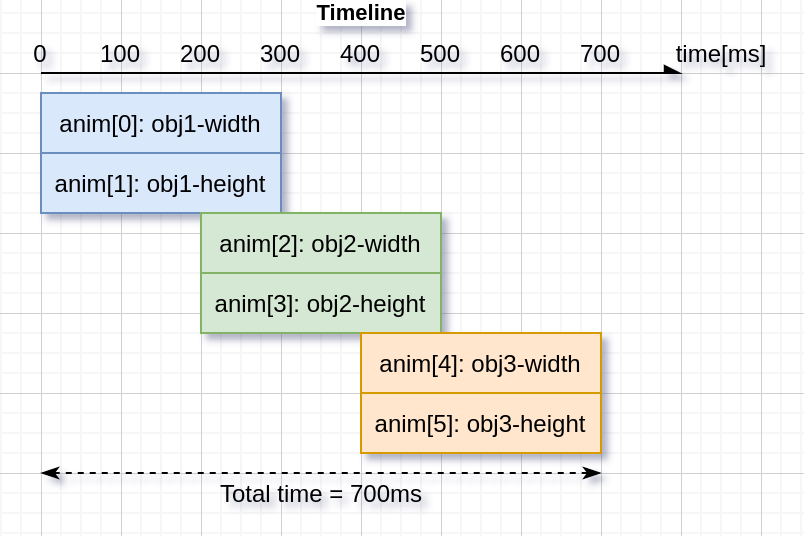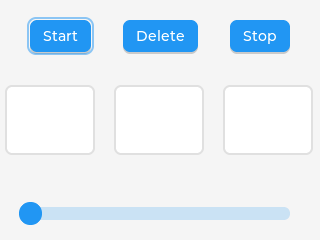App:Library:LVGL:docs:Overview:Animations
https://docs.lvgl.io/8.2/overview/animation.html
Animations
You can automatically change the value of a variable between a start and an end value using animations. Animation will happen by periodically calling an "animator" function with the corresponding value parameter.
The animator functions have the following prototype:
void func(void * var, lv_anim_var_t value);
This prototype is compatible with the majority of the property set functions in LVGL. For example lv_obj_set_x(obj, value) or lv_obj_set_width(obj, value)
Create an animation
To create an animation an lv_anim_t variable has to be initialized and configured with lv_anim_set_...() functions.
/* INITIALIZE AN ANIMATION *-----------------------*/ lv_anim_t a; lv_anim_init(&a); /* MANDATORY SETTINGS *------------------*/ /*Set the "animator" function*/ lv_anim_set_exec_cb(&a, (lv_anim_exec_xcb_t) lv_obj_set_x); /*Set target of the animation*/ lv_anim_set_var(&a, obj); /*Length of the animation [ms]*/ lv_anim_set_time(&a, duration); /*Set start and end values. E.g. 0, 150*/ lv_anim_set_values(&a, start, end); /* OPTIONAL SETTINGS *------------------*/ /*Time to wait before starting the animation [ms]*/ lv_anim_set_delay(&a, delay); /*Set path (curve). Default is linear*/ lv_anim_set_path(&a, lv_anim_path_ease_in); /*Set a callback to indicate when the animation is ready (idle).*/ lv_anim_set_ready_cb(&a, ready_cb); /*Set a callback to indicate when the animation is started (after delay).*/ lv_anim_set_start_cb(&a, start_cb); /*When ready, play the animation backward with this duration. Default is 0 (disabled) [ms]*/ lv_anim_set_playback_time(&a, time); /*Delay before playback. Default is 0 (disabled) [ms]*/ lv_anim_set_playback_delay(&a, delay); /*Number of repetitions. Default is 1. LV_ANIM_REPEAT_INFINITE for infinite repetition*/ lv_anim_set_repeat_count(&a, cnt); /*Delay before repeat. Default is 0 (disabled) [ms]*/ lv_anim_set_repeat_delay(&a, delay); /*true (default): apply the start value immediately, false: apply start value after delay when the anim. really starts. */ lv_anim_set_early_apply(&a, true/false); /* START THE ANIMATION *------------------*/ lv_anim_start(&a); /*Start the animation*/
You can apply multiple different animations on the same variable at the same time. For example, animate the x and y coordinates with lv_obj_set_x and lv_obj_set_y. However, only one animation can exist with a given variable and function pair and lv_anim_start() will remove any existing animations for such a pair.
Animation path
You can control the path of an animation. The most simple case is linear, meaning the current value between start and end is changed with fixed steps. A path is a function which calculates the next value to set based on the current state of the animation. Currently, there are the following built-in path functions:
lv_anim_path_linearlinear animationlv_anim_path_stepchange in one step at the endlv_anim_path_ease_inslow at the beginninglv_anim_path_ease_outslow at the endlv_anim_path_ease_in_outslow at the beginning and endlv_anim_path_overshootovershoot the end valuelv_anim_path_bouncebounce back a little from the end value (like hitting a wall)
Speed vs time
By default, you set the animation time directly. But in some cases, setting the animation speed is more practical.
The lv_anim_speed_to_time(speed, start, end) function calculates the required time in milliseconds to reach the end value from a start value with the given speed. The speed is interpreted in unit/sec dimension. For example, lv_anim_speed_to_time(20,0,100) will yield 5000 milliseconds. For example, in the case of lv_obj_set_x unit is pixels so 20 means 20 px/sec speed.
Delete animations
You can delete an animation with lv_anim_del(var, func) if you provide the animated variable and its animator function.
Timeline
A timeline is a collection of multiple animations which makes it easy to create complex composite animations.
Firstly, create an animation element but don’t call lv_anim_start().
Secondly, create an animation timeline object by calling lv_anim_timeline_create().
Thirdly, add animation elements to the animation timeline by calling lv_anim_timeline_add(at, start_time, &a). start_time is the start time of the animation on the timeline. Note that start_time will override the value of delay.
Finally, call lv_anim_timeline_start(at) to start the animation timeline.
It supports forward and backward playback of the entire animation group, using lv_anim_timeline_set_reverse(at, reverse).
Call lv_anim_timeline_stop(at) to stop the animation timeline.
Call lv_anim_timeline_set_progress(at, progress) function to set the state of the object corresponding to the progress of the timeline.
Call lv_anim_timeline_get_playtime(at) function to get the total duration of the entire animation timeline.
Call lv_anim_timeline_get_reverse(at) function to get whether to reverse the animation timeline.
Call lv_anim_timeline_del(at) function to delete the animation timeline.

Examples
Start animation on an event
Playback animation
Animation timeline
API
Typedefs
- typedef int32_t (*lv_anim_path_cb_t)(const struct _lv_anim_t*)[1]
- Get the current value during an animation
- typedef voi[2]d (*lv_anim_exec_xcb_t)(void*, int32_t)[3]
- Generic prototype of "animator" functions. Fir[4]st parameter is the variable to animate. Second parameter is the value to set. Compatible with
lv_xxx_set_yyy(obj, value)functions Thexin_xcb_tmeans it's not a fully generic prototype because it doesn't receivelv_anim_t *as its first argument
- typedef void (*lv_anim_custom_exec_cb_t)(struct _lv_anim_t*, int32_t)[5]
- Same as
lv_anim_exec_xcb_tbut receiveslv_anim_t *as the first [6]parameter. It's more consistent but less convenient. Might be used by binding generator functions.
- typedef void (*lv_anim_ready_cb_t)(struct _lv_anim_t*)[7]
- Callback to call when the animation is ready
- [8]typedef void (*lv_anim_start_cb_t)(struct _lv_anim_t*)[9]
- Callback to call when the animation really stars ([10]considering
delay)
- typedef int32_t (*lv_anim_get_value_cb_t)(struct _lv_anim_t*)[11]
- Callback used when the animation values are relative to g[12]et the current value
- typedef struct _lv_anim_t lv_anim_t[13]
- Describes an animation
Enums[14]
- enum lv_anim_enable_t[15]
- Can be used to in[16]dicate if animations are enabled or disabled in a case Values:
Functions
- LV_EXPORT_CONST_INT(LV_ANIM_REPEAT_INFINITE)[21]
- void lv_anim_init(lv_anim_t *a)[27]
- Initialize an animation var[28]iable. E.g.: lv_anim_t a; lv_anim_init(&a); lv_anim_set_...(&a); lv_anim_start(&a);
- Parameters
- a -- pointer to an
lv_anim_tvariable to initialize
- static inline void lv_anim_set_var(lv_anim_t *a, void *var)[29]
- Set a variable to animate
- Parameters
-
- a -- point[30]er to an initialized
lv_anim_tvariable - var -- pointer to a variable to animate
- a -- point[30]er to an initialized
- static inline void lv_anim_set_exec_cb(lv_anim_t *a, lv_anim_exec_xcb_t exec_cb)[31]
- Set a function to animate
var- Parameters
-
- a -- pointer to an initiali[32]zed
lv_anim_tvariable - exec_cb -- a function to execute during animation LVGL's built-in functions can be used. E.g. lv_obj_set_x
- a -- pointer to an initiali[32]zed
- static inline void lv_anim_set_time(lv_anim_t *a, uint32_t duration)[33]
- Set the duration of an animation
- Parameters
-
- a -- pointer[34] to an initialized
lv_anim_tvariable - duration -- duration of the animation in milliseconds
- a -- pointer[34] to an initialized
- static inline void lv_anim_set_delay(lv_anim_t *a, uint32_t delay)[35]
- Set a delay before starting the animation
- Parameters
-
- a[36] -- pointer to an initialized
lv_anim_tvariable - delay -- delay before the animation in milliseconds
- a[36] -- pointer to an initialized
- static inline void lv_anim_set_values(lv_anim_t *a, int32_t start, int32_t end)[37]
- Set the start and end values of an animation
- Parameters
-
- a -- pointe[38]r to an initialized
lv_anim_tvariable - start -- the start value
- end -- the end value
- a -- pointe[38]r to an initialized
- static inline void lv_anim_set_custom_exec_cb(lv_anim_t *a, lv_anim_custom_exec_cb_t exec_cb)[39]
- Similar to
lv_anim_set_exec_cbbutlv_anim_custom_exec_cb_treceiveslv_anim_t *as its f[40]irst parameter instead ofvoid *. This function might be used when LVGL is bound to other languages because it's more consistent to havelv_anim_t *as first parameter. The variable to animate can be stored in the animation'suser_data- Parameters
-
- a -- pointer to an initialized
lv_anim_tvariable - exec_cb -- a function to execute.
- a -- pointer to an initialized
- static inline void lv_anim_set_path_cb(lv_anim_t *a, lv_anim_path_cb_t path_cb)[41]
- Set the path (curve) of the animation.
- Parameters
-
- a -- pointer to a[42]n initialized
lv_anim_tvariable - path_cb -- a function to set the current value of the animation.
- a -- pointer to a[42]n initialized
- static inline void lv_anim_set_start_cb(lv_anim_t *a, lv_anim_start_cb_t start_cb)[43]
- Set a function call when the animation really starts (considering
delay)- Pa[44]rameters
-
- a -- pointer to an initialized
lv_anim_tvariable - start_cb -- a function call when the animation starts
- a -- pointer to an initialized
- static inline void lv_anim_set_get_value_cb(lv_anim_t *a, lv_anim_get_value_cb_t get_value_cb)[45]
- Set a function to use the current value of the variable and make start and end value relat[46]ive to the returned current value.
- Parameters
-
- a -- pointer to an initialized
lv_anim_tvariable - get_value_cb -- a function call when the animation starts
- a -- pointer to an initialized
- static inline void lv_anim_set_ready_cb(lv_anim_t *a, lv_anim_ready_cb_t ready_cb)[47]
- Set a function call when the animation is ready
- Parameters
-
- a -- pointe[48]r to an initialized
lv_anim_tvariable - ready_cb -- a function call when the animation is ready
- a -- pointe[48]r to an initialized
- static inline void lv_anim_set_playback_time(lv_anim_t *a, uint32_t time)[49]
- Make the animation to play back to when the forward direction is read[50]y
- Parameters
-
- a -- pointer to an initialized
lv_anim_tvariable - time -- the duration of the playback animation in milliseconds. 0: disable playback
- a -- pointer to an initialized
- static inline void lv_anim_set_playback_delay(lv_anim_t *a, uint32_t delay)[51]
- Make the animation to play back to when the forward direction is ready [52]
- Parameters
-
- a -- pointer to an initialized
lv_anim_tvariable - delay -- delay in milliseconds before starting the playback animation.
- a -- pointer to an initialized
- static inline void lv_anim_set_repeat_count(lv_anim_t *a, uint16_t cnt)[53]
- Make the animation repeat itself.
- Parameters
-
- a -- pointer t[54]o an initialized
lv_anim_tvariable - cnt -- repeat count or
LV_ANIM_REPEAT_INFINITEfor infinite repetition. 0: to disable repetition.
- a -- pointer t[54]o an initialized
- static inline void lv_anim_set_repeat_delay(lv_anim_t *a, uint32_t delay)[55]
- Set a delay before repeating the animation.
- Parameters
-
- a -- p[56]ointer to an initialized
lv_anim_tvariable - delay -- delay in milliseconds before repeating the animation.
- a -- p[56]ointer to an initialized
- static inline void lv_anim_set_early_apply(lv_anim_t *a, bool en)[57]
- Set a whether the animation's should be applied immediately o[58]r only when the delay expired.
- Parameters
-
- a -- pointer to an initialized
lv_anim_tvariable - en -- true: apply the start value immediately in
lv_anim_start; false: apply the start value only whendelayms is elapsed and the animations really starts
- a -- pointer to an initialized
- static inline void lv_anim_set_user_data(lv_anim_t *a, void *user_data)[59]
- Set the custom user data field of the animation.
- Parameters
-
- [60] a -- pointer to an initialized
lv_anim_tvariable - user_data -- pointer to the new user_data.
- [60] a -- pointer to an initialized
- lv_anim_t *lv_anim_start(const lv_anim_t *a)[61]
- Create an animation
- Parameters
- a -[62]- an initialized 'anim_t' variable. Not required after call.
- Returns
- pointer to the created animation (different from the
aparameter)
- static inline uint32_t lv_anim_get_delay(lv_anim_t *a)[63]
- Get a delay before starting the animation
- Param[64]eters
- a -- pointer to an initialized
lv_anim_tvariable - Returns
- delay before the animation in milliseconds
- uint32_t lv_anim_get_playtime(lv_anim_t *a)[65]
- Get the time used to play the animation[66].
- Parameters
- a -- pointer to an animation.
- Returns
- the play time in milliseconds.
- static inline void *lv_anim_get_user_data(lv_anim_t *a)[67]
- Get the user_data field of the animation
- Paramet[68]ers
- a -- pointer to an initialized
lv_anim_tvariable - Returns
- the pointer to the custom user_data of the animation
- bool lv_anim_del(void *var, lv_anim_exec_xcb_t exec_cb)[69]
- Delete an animation of a variable with a given anim[70]ator function
- Parameters
-
- var -- pointer to variable
- exec_cb -- a function pointer which is animating 'var', or NULL to ignore it and delete all the animations of 'var
- Returns
- true: at least 1 animation is deleted, false: no animation is deleted
- lv_anim_t *lv_anim_get(void *var, lv_anim_exec_xcb_t exec_cb)[73]
- Get the animation of a variable and its
exec_cb.- Param[74]eters
-
- var -- pointer to variable
- exec_cb -- a function pointer which is animating 'var', or NULL to return first matching 'var'
- Returns
- pointer to the animation.
- static inline bool lv_anim_custom_del(lv_anim_t *a, lv_anim_custom_exec_cb_t exec_cb)[75]
- Delete an animation by getting the animated variable from
a. Only animations with[76]exec_cbwill be deleted. This function exists because it's logical that all anim. functions receives anlv_anim_tas their first parameter. It's not practical in C but might make the API more consequent and makes easier to generate bindings.- Parameters
-
- a -- pointer to an animation.
- exec_cb -- a function pointer which is animating 'var', or NULL to ignore it and delete all the animations of 'var
- Returns
- true: at least 1 animation is deleted, false: no animation is deleted
- static inline lv_anim_t *lv_anim_custom_get(lv_anim_t *a, lv_anim_custom_exec_cb_t exec_cb)[77]
- Get the animation of a variable and its
exec_cb. This function exists because it's logi[78]cal that all anim. functions receives anlv_anim_tas their first parameter. It's not practical in C but might make the API more consequent and makes easier to generate bindings.- Parameters
-
- a -- pointer to an animation.
- exec_cb -- a function pointer which is animating 'var', or NULL to return first matching 'var'
- Returns
- pointer to the animation.
- uint16_t lv_anim_count_running(void)[79]
- Get the number of currently runn[80]ing animations
- Returns
- the number of running animations
- uint32_t lv_anim_speed_to_time(uint32_t speed, int32_t start, int32_t end)[81]
- Calculate the time of an animation with a given speed and the start an[82]d end values
- Parameters
-
- speed -- speed of animation in unit/sec
- start -- start value of the animation
- end -- end value of the animation
- Returns
- the required time [ms] for the animation with the given parameters
- void lv_anim_refr_now(void)[83]
- Manually refresh the st[84]ate of the animations. Useful to make the animations running in a blocking process where
lv_timer_handlercan't run for a while. Shouldn't be used directly because it is called inlv_refr_now().
- int32_t lv_anim_path_linear(const lv_anim_t *a)[85]
- Calculate the current value of an animation[86] applying linear characteristic
- Parameters
- a -- pointer to an animation
- Returns
- the current value to set
- int32_t lv_anim_path_ease_in(const lv_anim_t *a)[87]
- Calculate the current value of an animation [88]slowing down the start phase
- Parameters
- a -- pointer to an animation
- Returns
- the current value to set
- int32_t lv_anim_path_ease_out(const lv_anim_t *a)[89]
- Calculate the current value of an animation s[90]lowing down the end phase
- Parameters
- a -- pointer to an animation
- Returns
- the current value to set
- int32_t lv_anim_path_ease_in_out(const lv_anim_t *a)[91]
- Calculate the current value of an animation appl[92]ying an "S" characteristic (cosine)
- Parameters
- a -- pointer to an animation
- Returns
- the current value to set
- int32_t lv_anim_path_overshoot(const lv_anim_t *a)[93]
- Calculate the current value of an animation wi[94]th overshoot at the end
- Parameters
- a -- pointer to an animation
- Returns
- the current value to set
- int32_t lv_anim_path_bounce(const lv_anim_t *a)[95]
- Calculate the current value of an animation[96] with 3 bounces
- Parameters
- a -- pointer to an animation
- Returns
- the current value to set
- int32_t lv_anim_path_step(const lv_anim_t *a)[97]
- Calculate the current value of an animati[98]on applying step characteristic. (Set end value on the end of the animation)
- Parameters
- a -- pointer to an animation
- Returns
- the current value to set
- struct _lv_anim_t[99]
- #include <lv_[100]anim.h> Describes an animation Public Members
- void *var[101]
- Varia[102]ble to animate
- lv_anim_exec_xcb_t exec_cb[103]
- Function to execute to[104] animate
- lv_anim_start_cb_t start_cb[105]
- Call it when the animat[106]ion is starts (considering
delay) - lv_anim_ready_cb_t ready_cb[107]
- Call it when the animat[108]ion is ready
- lv_anim_get_value_cb_t get_value_cb[109]
- Get the current value in relati[110]ve mode
- void *user_data[111]
- Custom user[112] data
- lv_anim_path_cb_t path_cb[113]
- Describe the path (cu[114]rve) of animations
- int32_t start_value[115]
- Start value
- [116]
- int32_t current_value[117]
- Current value
- [118]
- int32_t end_value[119]
- End value
- [120]
- int32_t time[121]
- Animatio[122]n time in ms
- int32_t act_time[123]
- Current time[124] in animation. Set to negative to make delay.
- uint32_t playback_delay[125]
- Wait before play ba[126]ck
- uint32_t playback_time[127]
- Duration of playba[128]ck animation
- uint32_t repeat_delay[129]
- Wait before repea[130]t
- uint16_t repeat_cnt[131]
- Repeat count fo[132]r the animation
- uint8_t early_apply[133]
- 1: Apply start [134]value immediately even is there is
delay - uint8_t playback_now[135]
- Play back is in [136]progress
- uint8_t run_round[137]
- Indicates the[138] animation has run in this round
- uint8_t start_cb_called[139]
- Indicates that the [140]
start_cbwas already called


